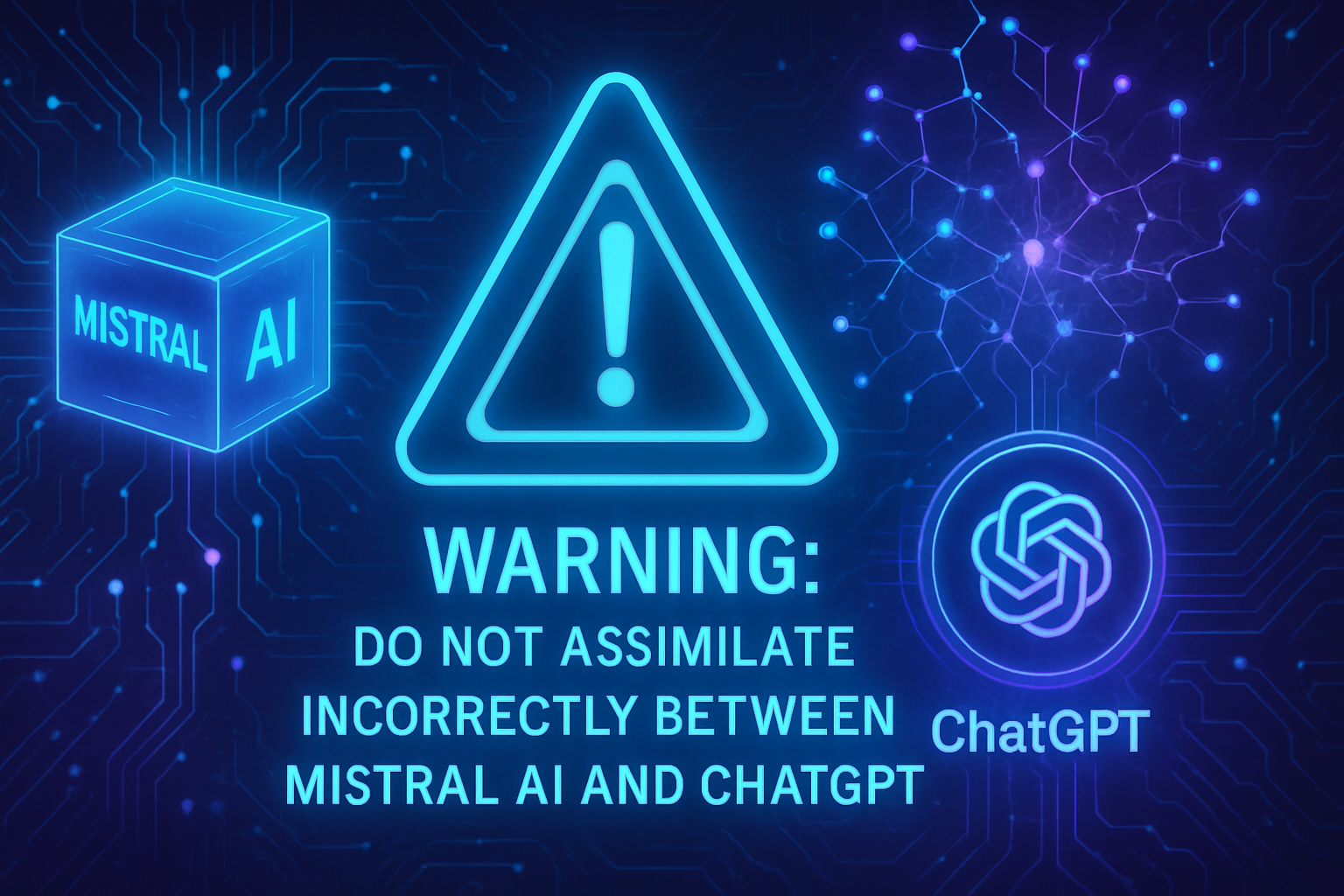The assimilation of Mistral AI to ChatGPT creates regrettable confusions. The erroneous perception of these two entities can obscure the real stakes of artificial intelligence. Mistral AI represents French innovation, distinct from its American counterparts. Distinguishing these technologies is essential for understanding the future directions of the sector. Excessive expectations risk hindering its development. Appreciating the unique identity of Mistral AI is imperative to support its growth.
Mistral AI in the landscape of artificial intelligence
Mistral AI, a French start-up, stands out in the artificial intelligence sector, but should not be confused with ChatGPT. Although both technologies are based on deep learning architectures, their approaches and applications differ significantly. While ChatGPT was developed by OpenAI through a natural language processing (NLP) methodology, Mistral AI focuses on solutions more tailored to specific needs, particularly enhancing performance in varied environments.
The fundamental differences in technology
The underlying algorithms of Mistral AI and ChatGPT involve notable differences. Mistral AI relies on more flexible and modular models, allowing it to address a wide range of tasks, from data analysis to predictions in expert contexts. In contrast, ChatGPT excels primarily in textual conversations and smooth text generation.
Architectural choices also influence performance. Mistral AI emphasizes computational efficiency, enabling businesses to integrate AI without requiring excessive computing resources. Conversely, ChatGPT often requires more robust infrastructures to operate optimally.
The ambitions of Mistral AI
Although Mistral AI is still considered modest in size compared to giants like Nvidia or Microsoft, its ambition is evident. The company recently raised up to $1.1 billion, reflecting the growing interest in its innovations. This substantial funding allows Mistral AI to pursue its research and develop artificial intelligence solutions that can genuinely compete in the market.
The implications of notoriety and opportunities
The successes of Mistral AI are not merely the result of chance. The two founders, Arthur Mensch and Guillaume Lample, along with Timothée Lacroix, have successfully leveraged their previous experiences in technology giants. However, this notoriety can create high expectations, even pressure to conform to industry standards.
There is a risk that Mistral AI might be pushed to become a national “champion,” which could place the company in a vulnerable position. A strong dependence on government research mechanisms could compromise its independence and capacity for innovation.
Regulatory challenges and support
In the context of increasing regulation of artificial intelligence, Mistral AI must navigate a complex landscape. Regulatory entities, particularly in Brussels, are working to establish frameworks that govern the development of AI. The company must meet these requirements while preserving its creative agility. Discussions about AI ethics, especially in response to concerns about bias in models, amplify this issue.
The use of public resources to strengthen innovation in France is necessitated by the significant challenge of heightened competition. Public bodies must ensure that support does not become a hindrance to innovation, a delicate balance to achieve.
Conclusion on the identity of Mistral AI
As Mistral AI positions itself as a promising player, it is essential to understand that its journey is not akin to that of ChatGPT. The contexts of use, technologies, and ambitions cannot be reduced to a simple comparison. Rather than conforming to conventions, Mistral AI will seek to carve its own path in the dynamic and ever-evolving world of artificial intelligence.
Frequently asked questions about Mistral AI and ChatGPT
Why is it important not to confuse Mistral AI with ChatGPT?
It is crucial not to confuse Mistral AI and ChatGPT because these two technologies have different goals, architectures, and applications. Mistral AI is a French startup specializing in artificial intelligence solutions, while ChatGPT is a generative model developed by OpenAI, primarily designed for natural language interactions.
What are the fundamental differences between Mistral AI and ChatGPT?
The fundamental differences lie in their designs and applications. Mistral AI may have algorithms designed for specific tasks, while ChatGPT is optimized for conversational text generation. Additionally, Mistral AI’s models may be oriented toward specific industry problems, while ChatGPT is more generalist.
What are the main application areas of Mistral AI?
Mistral AI focuses on areas such as data analysis, computer vision, and solutions specific to sectors such as healthcare, finance, or automotive. These applications solve concrete problems, utilizing artificial intelligence to optimize processes.
Can Mistral AI compete with giants like OpenAI?
Mistral AI has the potential to compete with giants like OpenAI due to its innovation and technical expertise. However, its ability to stand out will depend on its development strategy and its capacity to meet the specific needs of the market.
How can Mistral AI position itself in the face of the rise of ChatGPT?
Mistral AI can strategically position itself by focusing on niches and specific applications that are not fully covered by ChatGPT, while offering solutions tailored to local and sector-specific needs, in order to leverage its strengths as a French startup in the field of AI.
Does Mistral AI have an artificial intelligence model similar to that of ChatGPT?
No, Mistral AI does not employ a model similar to ChatGPT. Each company develops its models based on its own needs and methodologies. Mistral AI focuses more on algorithms suited to business needs, rather than a generative conversational model like ChatGPT.
What is the importance of the distinction between these two technologies for potential users?
The distinction is essential for potential users, as it influences the choice of the artificial intelligence solution to adopt. Understanding the capabilities and limitations of Mistral AI compared to ChatGPT allows businesses to make informed choices regarding the implementation of tools suited to their specific objectives.






